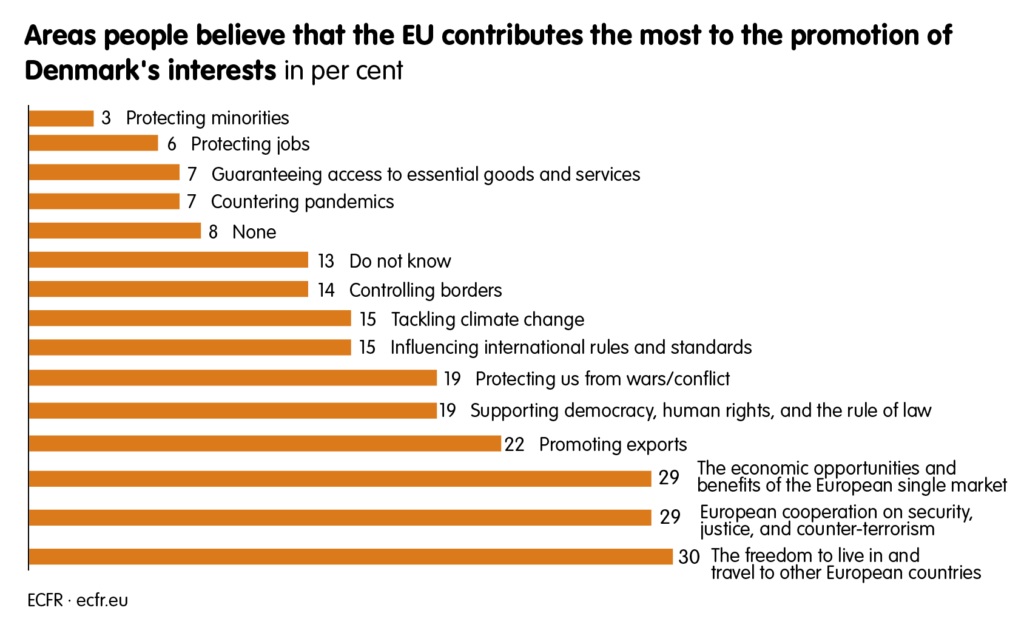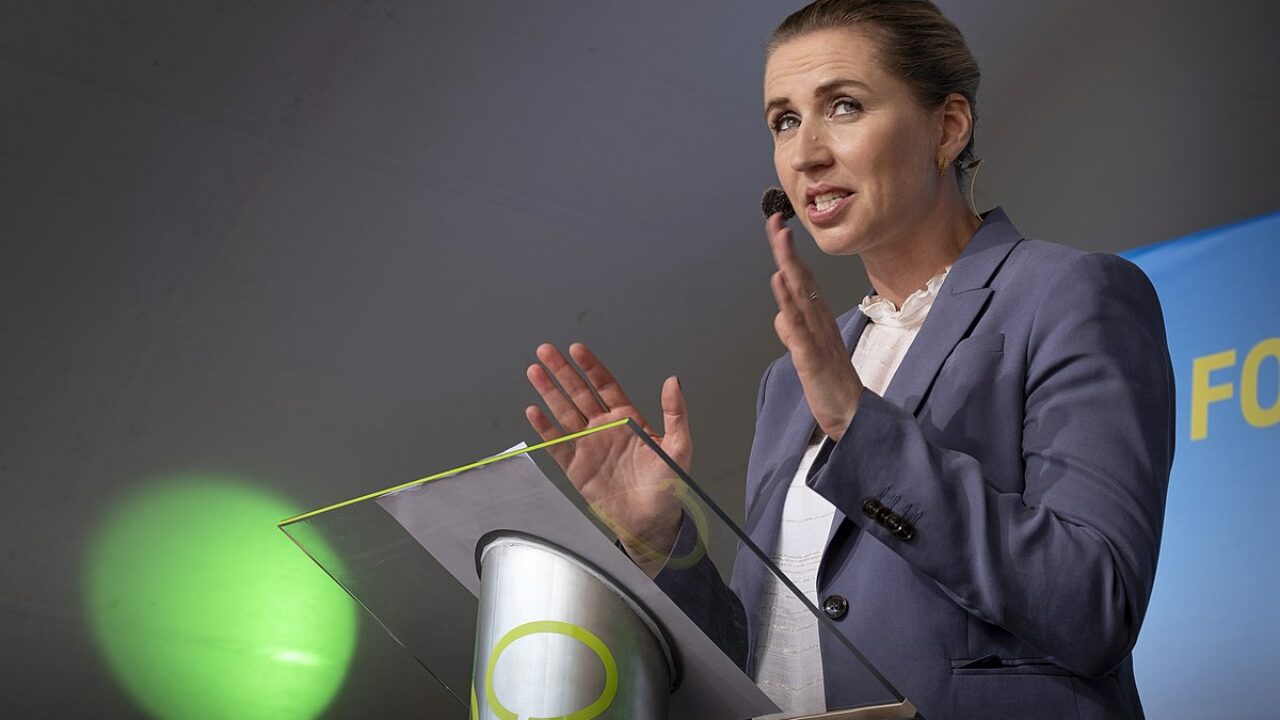Three reasons why Denmark could transform its relationship with the EU
New survey data from ECFR and Think Tank EUROPA reveal why Danes may be abandoning some of their traditional attitudes towards EU policy
Denmark’s membership of the so-called ‘frugal four’ will have surprised no one. As a net contributor to the EU budget with a long-standing reputation for Euroscepticism – and as a non-eurozone country that has opted out of EU migration and defence policy – Denmark was widely expected to oppose some elements of the €750bn covid-19 recovery fund that EU leaders agreed to in July this year, as well as the proposal to increase the overall EU budget.
But, as shown by data from the European Council on Foreign Relations’ new opinion poll, co-produced with Think Tank EUROPA, there is no 1:1 correlation between Denmark’s official position and Danish public opinion. One can draw at least three conclusions from this finding.
1. Danes may be frugal, but they are committed Europeans
To start with, the Danish public do not appear to be quite as frugal as the Danish government – whose leader, Mette Frederiksen, stated in October 2019 that the thought of increasing the EU budget was “completely gaga”. At least 78 per cent of those polled by ECFR and EUROPA do not agree with the statement that “the EU is spending too much money” on the recovery fund. And 70 per cent do not have a negative emotional reaction to the fund. The absence of frugality is most pronounced among the youngest respondents, just 16 per cent of whom state that the EU is spending too much.
These results support a decade of findings in the biannual Eurobarometer surveys, which show that a large majority of Danes believe that Denmark “benefits” from being in the EU (the share has been higher than 80 per cent in recent years). The infamous Euroscepticism expressed through Denmark’s EU referenda, which have resulted in three votes against further integration, has a lot more to do with opposition to the idea of shared competences than with paying more into the EU budget: it is sovereignty-based Euroscepticism rather than economic Euroscepticism.
This does not mean that the Danes demand an even bigger EU budget. Rather, as shown in an October 2020 poll conducted by Kantar for the European Parliament, Danes are less likely than citizens of other EU countries to agree that the EU should have greater financial means to overcome the consequences of the pandemic. Thirty-one per cent in Denmark held this view, compared to 53 per cent on average in the EU. But importantly, in the here and now, most Danes appear committed to the budget and the recovery fund.
2. Danes perceive a decline in their country’s influence in the EU
New alliances such as the frugals could take on much greater importance for Denmark than merely serving as a budget buffer.
Adding to the story, Danes are less likely than citizens of other EU countries to expect to be hit economically by the coronavirus crisis. According to the Kantar poll, 54 per cent of citizens in Denmark say that the virus will not have an impact on their personal income. That figure is far higher than the EU27 average of 27 per cent – and even than the maximum of 41 per cent in other frugal countries. There is no acute sense among Danes that Denmark will need to financially benefit from EU solidarity any time soon. This perceived absence of a give-and-take relationship may underpin frugal sentiments in Denmark.

According to the new ECFR and EUROPA poll, the biggest reason for concern about Danes’ enthusiasm for EU membership comes not from popular opposition to a big budget, but from the perception that the influence of Denmark in the EU is in decline. Almost four in ten Danes find that to have been the case over the last two or three years, while just two out of ten say that Denmark’s influence has increased. The sense of decline is felt rather evenly across political divides, though most strongly by supporters of parties to the right of the political spectrum, who are currently in opposition.
This perception of declining influence may be partly informed by Brexit, as the United Kingdom was traditionally seen in Denmark as a like-minded member state. To the extent that this is true, new alliances such as the frugals could take on much greater importance for Denmark than merely serving as a budget buffer. But – if it is to have an impact on leaders in Brussels, Berlin, and Paris – this alliance will depend for its potency on more than merely keeping the budget as small as possible.
As such, one of the key battlegrounds for a new, transformative agenda for the frugals could be in maintaining a competitive edge in discussions on an EU industrial policy. The coronavirus crisis has amplified protectionist sentiment across many parts of Europe, and Brexit means that market-oriented member states – not only Denmark, but also Finland, the Netherlands, and Sweden – have lost a large and influential ally. A strong and united display by these countries could go a long way to alleviating the sense of declining influence among small member states after Brexit.
3. Danes may be ready for a new EU security agenda
Finally, in a Danish context, the survey data on the EU’s value in various policy areas are revealing. When asked to select up to three areas in which the EU contributes the most to promoting Denmark’s interests, Danes answered “European cooperation on security, justice and terrorism” more often than any of 12 other areas, aside from the classic “the freedom to live in and travel to other European countries”.
This finding likely echoes a general demand in several countries over recent years for more control in an uncertain international environment. But it is especially important in Denmark, the only country in the union with an opt-out from justice and home affairs cooperation.
Just five years ago, Danes made their opposition to EU involvement in this policy area abundantly clear at a referendum, in which a majority of voters rejected the option of replacing the opt-out with an opt-in agreement. The new survey data from ECFR and EUROPA suggest that events since 2015 may have set in motion a fundamental shift in Danish public opinion on the EU. Danes appear to be moving away from their traditional wish to restrict cooperation to purely economic matters and towards a stronger demand for an EU security agenda.
The European Council on Foreign Relations does not take collective positions. ECFR publications only represent the views of their individual authors.



